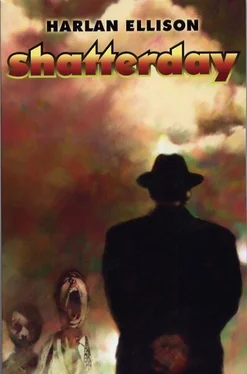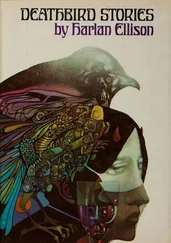She tacked against the wind, and headed in to the island. Reality was fighting back. If the real world was too horrible for the lives it served, then the real world would alter itself. Anne Marie Stebner beached the catamaran and ran up the sand toward the golden island dwellers.
“Hi,” she called to them. “I’ve always wanted to live in a place” like this, I just didn’t know where to go to find it. What’s happening around here?”
So they told her. And she could not, in her wildest dreams, have believed anything could be that terrifically interesting. But it was. There in the real world.
The Other Eye of Polyphemus
Introduction
I was dragged, kicking and screaming, on a tour through the lives of two women, once upon a time.
It was one of the most awful experiences of all time.
Including the Spanish Inquisition, the murder of Garcia Lorca, the genocide of the Brazilian indians, the crucifixion of Spartacus’ army of slaves, the sinking of the Titanic, the fire-bombing of Dresden and the trial of the Scottsboro Boys. This experience, I tell you, contained elements of all of the above, plus a few personal nasties that make me shudder when I think of them.
The experience does not, in any but one isolated reference, appear in this story. But it was that long night that inspired the writing.
Further, deponent sayeth not.
Yuccchhhh.
THIS IS ABOUT Brubaker, who is a man, but who might as easily have been a woman; and it would have been the same, no difference: painful and endless.
She was in her early forties and crippled. Something with the left leg and the spine. She went sidewise, slowly, like a sailor leaving a ship after a long time at sea. Her face was unindexed as to the rejections she had known; one could search randomly and find a shadow here beneath the eyes that came from the supermarket manager named Charlie; a crease in the space beside her mouth, just at the left side, that had been carved from a two nights’ association with Clara from the florist shop; a moistness here at the right temple each time she recalled the words spoken the morning after the night with the fellow who drove the dry cleaner’s van, Barry or Benny. But there was no sure record. It was all there, everywhere in her face.
Brubaker had not wanted to sleep with her. He had not wanted to take her home or go to her home, but he had. Her apartment was small and faced out onto a narrow court that permitted sunlight only during the hour before and the hour following high noon. She had pictures from magazines taped to the walls. The bed was narrow.
When she touched him, he felt himself going away. Thinking of warm places where he had rested on afternoons many years before; afternoons when he had been alone and had thought that was not as successful a thing to be as he now understood it to be. He did not want to think of it in this way, but he thought of himself as a bricklayer doing a methodical job. Laying the bricks straight and true.
He made love to her in the narrow bed, and was not there. He was doing a job, and thought how unkind and how unworthy such thoughts seemed to be… even though she would not know he was away somewhere else. He had done this before, and kindness was something he did very well. She would feel treasured, and attended, and certainly that was the least he could do. Her limp, her sad and lined face. She would think he was in attendance, treasuring her. He had no needs of his own, so it was possible to give her all that without trembling.
They both came awake when an ambulance screamed crosstown just beneath her window, and she looked at him warmly and said, “I have to get up early in the morning, we’re doing inventory at the office, the files are really in terrible shape.” But her face held a footnote expression that might have been interpreted as You can stay if you want, but I’ve been left in beds where the other side grows cool quickly, and I don’t want to see your face in the morning with that look that tells me you’re trying to work up an excuse to leave so you can rush home to take the kind of shower that washes the memory of me off you. So I’m giving you the chance to go now, because if you stay it means you’ll call tomorrow sometime before noon and ask if I’d like to have dinner and see an early movie.
So he kissed her several times, on the cheeks and once—gently—on the mouth, with lips closed; a treasuring kiss. And he left her apartment.
The breeze blew gently and coolly off the East River, and he decided to walk down past Henderson Place to sit in the park. To give himself time to come back from those far places. He felt partially dissolved, as if in sending himself out of that apartment he had indulged in some kind of minimal astral projection. And now that he was ready to receive himself again, there was a bit of his soul missing, left behind in her bed.
He had a tiny headache, the finest point of pain, just between and above his eyes, somewhere pierced behind the hard bone over the bridge of his nose. As he walked toward the park, he rubbed the angles of his nose between thumb and forefinger.
Carl Schurz Park was calm. Unlike vast sections of the city, it could be visited after dark without fear. The stillness, the calmness: marauders seldom lurked there.
He took a bench and sat staring off across the cave of water. The pain was persistent and he massaged the inner comers of his eyes with a gentle fingertip.
There had been a woman he had met at a cocktail party. From Maine. He hesitated to think of her in such simplified ways, but there was no denying her sweetness and virginity. Congregationalist, raised too well for life in this city, she had come here from Maine to work in publishing, and the men had not been good to her. Attracted by her well-scrubbed face and her light, gentle manner, they had stepped out with her two, three, once even four times. But she had been raised too well for life taken in late-night sessions, and they had drifted back to their meat racks and their loneliness mutually shared. One had even suggested she seduce a platonic friend of hers, a gentle young man coming to grips with his sexuality, and then she would be fit for a proper affair. She had asked him to leave. The following week he was seeing the wife of a production assistant at the publishing house in which they all labored, and the girl from Maine had signed up for tap dancing lessons.
She had met Brubaker at the cocktail party and they had talked, leaning out the thirty-first floor window to escape the smoke and the chatter.
It became clear to him that she had decided he was the one. Reality and upbringing waged their war in her, and she had decided to capitulate. He walked her home and she said, “Come in for a graham cracker. I have lots of them.” He said, “What time is it?” His watch said 12:07. ‘‘I’ll come up till twelve-fifteen.” She smiled shyly and said, “I’m being aggressive. It’s not easy for me.” He said, “I don’t want to come up for very long. We might get into trouble.” He meant it. He liked her. But she was hurting. “It’s not a kind of trouble you haven’t been in before,” she said. He smiled gently and said, “No, but it’s a kind of trouble you’ve never been in.”
But he could not refuse her. And he was good with her, as good as he could be, accepting the responsibility, hoping when she found the man she had been saving herself for, he would be very very loving. At least, he knew, he had put her out of reach of the kind of men who sought virgins. Neither the sort who would marry only a virgin, nor the predators who went on safari for such endangered species were human enough for her.
And when he left, the next morning, he had a headache. The same pinpoint of anguish that now pulsed between and above his eyes as he sat in the park. He had felt changed after leaving her, just as he did tonight. Was there a diminishing taking place?
Читать дальше












